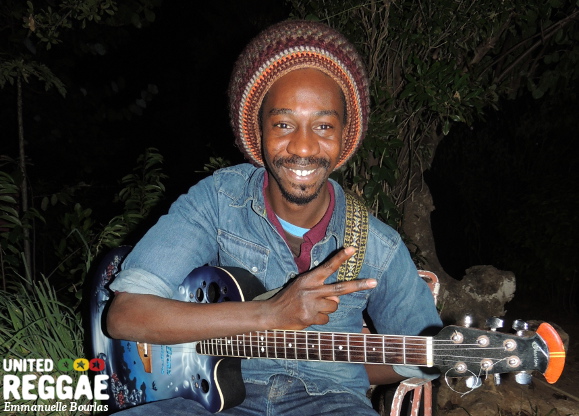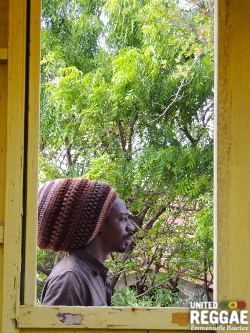Articles about reggae music, reviews, interviews, reports and more...
Interview: Meta Dia
- Home
- Articles
- Interviews
- Interview: Meta Dia

Interview: Meta Dia
"The next album is already done. I just have to fix the date to put it out"
Sampler
On 2nd July New Zealand reggae ambassadors Katchafire played the first of two consecutive dates at London’s Garage in Highbury supported by Australia’s Blue King Brown. Added at the last minute to the bill were Senegalese singer Meta Dia and his internationally peopled group the Cornerstones – whose second album 'Ancient Power' has been trumpeted by critics as one of the best of 2013 so far. With no headline date in London included on Meta’s European tour (all too typical of European reggae tours in general) United Reggae had to see this man in action. Little did we know we would get to meet him as well…

The drum and the bass are the cornerstone of the live reggae experience. Yet despite being unknown to the largely Antipodean London crowd, Meta could be found holding the room enraptured using a band with no rhythm section - only guitarists Shahar Mintz and Daniel Serrato plus Aya Kato on keyboards.
It is another truism that you haven’t really appreciated reggae’s great modern voices such as Jah Cure and Tarrus Riley until you’ve heard them in person - free of digital eq-ing and compression. Meta definitely fits into that elite category. A concert encounter with his sweetly complex timbre - think Bob Marley’s Survival era in broken-grain tone and Peter Morgan of Morgan Heritage in range - should send you scurrying back to his records with a greater appreciation thereafter.
Backstage after the show, dwarfed by his huge tam, the lanky, ever-smiling Meta seems as surprised to be here as we are. He decided to stop over having finished the Afro Latino Festival in Belgium while en route to the Montreal Jazz Festival in Canada.
“We’re just doing a pass through” he says in clear but not fluent English “It’s a last minute thing that we knew about it. We heard through Blue King Brown who are cool friends of ours. We wanted to experience the people and coming to London. So we decided “Why not come and do a little jam? Let’s cross here and after head to Canada”.”
“This is my first time in London. Definitely very good but I wish I could come with the whole band.”
Unfortunately, again, all too typically for reggae artists coming to the UK, Visa issues meant bassist Rupert Mackenzie and drummer Wayne Fletcher were stopped at the border. But Meta is used to performing in front of strange audiences and making the best of what he has to hand. At age 14 he was a street performer in his birth city of Dakar.
“In Senegal I started as a rapper on the streets so I used to play in the middle of the streets and people would circle around us and we would be there exchanging the vibes rapping. It was only when I moved to the US that was when I started playing guitar and singing.”
 I grew up listening to my mum playing a lot of Gregory Isaacs and Bob Marley
I grew up listening to my mum playing a lot of Gregory Isaacs and Bob Marley
Musicologists have attempted to trace the West African roots of the reggae rhythm. Suggestions include the Yankhadi rhythm from Guinea. But for Meta reggae was just something that was around growing up in the diverse culture of Dakar.
“Senegal plays lots of kinds of music like Salsa, Merengue, Samba and Mbalax which is our national music. And we also got to hold all the music that comes from the US. I pretty much grew up listening to my mum playing a lot of Gregory Isaacs and Bob Marley.”
Like many youth who grew up with reggae in the parental home, the young Meta took it for granted. Hip hop was his first love.
“At that time I was young and I used to feel the vibration but for me it was always sounding the same. I just heard the skank, maybe my knowledge wasn’t that wide ranging to understand the reggae music fully. We didn’t speak English so it was very hard. But I always felt it. When I moved to the US that’s when I started discovering reggae, understanding English and hearing the message. What put me really, really into it is the message.”
 In 2002 Meta migrated to the USA but his growing knowledge of English meant many of US hip hop’s lyrics were a disappointment.
In 2002 Meta migrated to the USA but his growing knowledge of English meant many of US hip hop’s lyrics were a disappointment.
“I like writing and I like to deliver messages. The peace, the love, the spirituality, the harmony. The consciousness that is inside. That’s what triggers everything. Even in my hip hop I always wanted to put out the consciousness. When I went to the US it was a different story for the hip hop for me to be related automatically. I started understanding English and was like “Wow this is the writing they give - all cursewords all of this!” So I don’t feel connected to that.”
“I’m more the peace, love and harmony – upliftment. Telling stories from friends where we sit down and had a nice conversation. That conversation that inspires me to write, so songs come from a specific place. Not just sitting down and trying to rhyme. You have to come from somewhere original.”
In 2008 Meta released his first album with the Cornerstones, Forward Music. Meta’s desire to learn English was the reason why it would be another five years before he would issue a follow-up.
“The gap was because for the first album I was still learning. I would write all my lyrics. So when I heard the album of course I put across what I wanted to say. But I wanted to say it more. I was not able at that time to express myself in English fully so I took my time to write more and develop myself more in the culture of New York until I was sure that now I was ready.”
 I like to deliver messages. The peace, the love, the spirituality, the harmony. The consciousness that is inside
I like to deliver messages. The peace, the love, the spirituality, the harmony. The consciousness that is inside
Like his London appearance, the final track-listing of second album Ancient Power was an eleventh hour decision. Two songs - Mr Jamaica and Trouble My Soul - were removed from the initial promo version sent out and replaced with two cuts of the rock influenced Without Heart. This, says Meta, was due to the intervention of a very special person.
“Recently in the past two years I recorded so many songs going to Jamaica doing the album. I recorded around fifteen, sixteen tracks. So from those fifteen, sixteen tracks I chose the ones I wanted to release. Later on a lot of the people were hearing this version and telling me “Oh! Why not put this one or that one?”.”
“My father loved Without Heart and said “Why is this not in the album?” So at the last minute I decided that, since the album waited a couple of months, to put those two tracks and remove the two other tracks for singles.”
Meta is very keen to point out that he has many influences beyond Jamaican reggae – including soft rock artists such as Irish balladeer Damien Rice.
“For me it is not only Jamaica or this place or that place. Because there are some good writers out there. I am a big fan of Damien Rice. You know they have something. They have a beautiful message and upliftment to give that is different. It is not only steeped in reggae.”
 I definitely like Chronixx. I see that he is coming with the positive vibration
I definitely like Chronixx. I see that he is coming with the positive vibration
But recording Ancient Power at Tuff Gong studios in Jamaica still meant a lot to him. He is flattered by the suggestion that Survival is a big influence on the songs and his voice.
“Oh nice! I love that album. I love all of his albums but thank you yeah! I listen to all kinds of music but going to Jamaica it was the reggae. Feeling the Bob Marley vibration at Tuff Gong – that’s what brought me there.”
He is also pleased about the upcoming conscious movement in Jamaica – even though in his view it is far from dominant.
“Yeah, pretty much I see it all the time. Also there is a balance. Some other people they do other kinds of music they still say whatever they want and promote whatever they want. I definitely like Chronixx. I see that he is coming with the positive vibration and the good message.”
And he is receptive to the idea that the sound of his voice live has yet to be fully captured on record.
“Yeah, definitely. For me live is the best part of being a musician. Mostly live there’s the realness there for the voice and the message so you know. Sometimes I realize that when I play live there are different emotions with the people. Because for me you have the song, you have the story, you know where it comes from but the people that are there – that energy, that connection – it makes you sing more. So sometimes I say if they are in a mood you are catching that mood also. You are giving back what they are giving you and that makes the live sound you are getting.”
 For me live is the best part of being a musician
For me live is the best part of being a musician
Meta and the Cornerstones may see themselves as a work in progress. But their effect on the collective mood at the Garage did not go unnoticed. Meta was invited back on stage by both Blue King Brown and Katchafire and promptly booked to appear in a second slot the next night.
They then headed off for the Montreal Jazz Festival Festival as intended. In October they plan another European tour and some dates in Africa and Brazil. And there is also good news for fans waiting for a third album.
“The next album is already done. I just have to fix the date to put it out. But I want to save the title for me!”
See the photos of Meta live at the show in London below.
Read more about this topic
Comments actually desactivated due to too much spams
Browse by categories
Recommended Articles
Latest articles
Recently addedView all
© 2007-2026 United Reggae. All Rights Reserved. Reproduction in whole or in part is prohibited. Read about copyright
Terms of use | About us | Contact us | Authors | Newsletter | A-Z




























